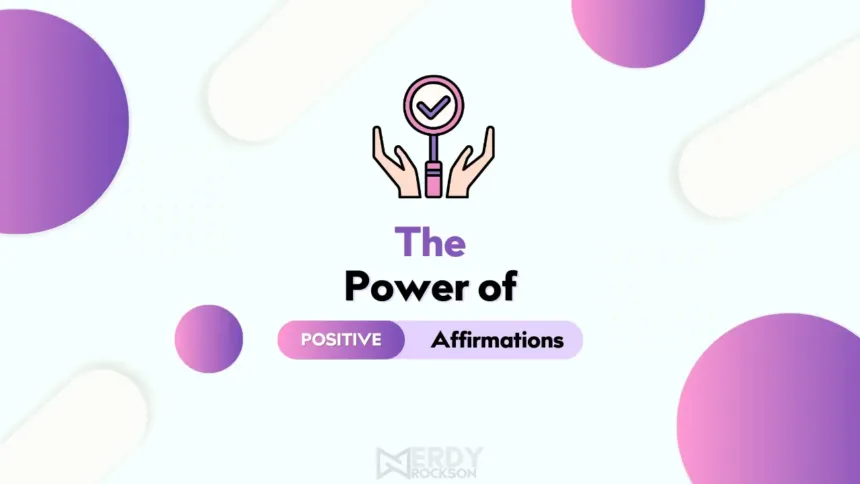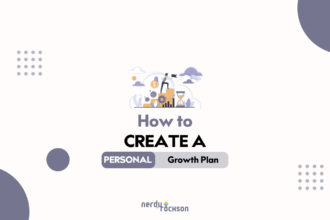Have you ever wondered how athletes excel, how public speakers inspire, or how your confident colleague always nails presentations? A common thread that often runs amongst these individuals is the power of positive affirmations. Harnessing this power can significantly influence personal growth and self-improvement.
In this informative guide, we delve deep into the psychology of positive affirmations, their tangible benefits, practical real-life examples, and how you can customize your powerful affirmations. We also highlight key factors influencing affirmation effectiveness and provide useful tips to incorporate them into your daily routine. Get ready to explore the transformative potential of positive affirmations!
According to a study by the National Institutes of Health, self-affirmation can mitigate the effects of stress and improve problem-solving under pressure, underscoring the profound impact affirmations can have on our daily lives.
In this comprehensive article, you’ll discover some essential tools and techniques to shape your journey of personal growth. So whether you’re a beginner or experienced in using affirmations, this guide promises new insights for everyone.
The power of positive affirmations lies not merely in their repetition but in their truthfulness from your own perception, emotion, and intention.
Understanding Positive Affirmations
Positive affirmations – these two simple words pack a powerful punch in shaping our mindset and personal growth. But what exactly are positive affirmations, and why are they so impactful?
Positive affirmations are short, powerful statements that individuals use to foster a positive mindset and challenge negative or self-sabotaging thoughts. By repetitively speaking these affirmations to ourselves, we start to believe them, and this, in turn, influences our attitudes, behaviors, and actions toward accomplishing our goals.
Folks, that’s just the tip of the iceberg. This article will serve as a comprehensive guide, diving deeper into the world of positive affirmations, their numerous benefits on personal growth, and the strategy to create and employ them effectively. Have you ever wondered how positive affirmations work? Let’s commence the exploration.
Affirmations are our mental vitamins, providing the supplementary positive thoughts we need to balance the barrage of negative events and thoughts we experience daily.
Tia Walker
In this guide, we cover the following areas:
- The psychology behind positive affirmations
- Benefits of positive affirmations on personal growth
- Real-life examples of positive affirmations improving personal growth
- How to create effective positive affirmations
- Key factors influencing the effectiveness of an affirmation
- Tips to incorporate positive affirmations into your routine
- Pitfalls to avoid when using affirmations
Ready to nurture your thought garden with positive affirmations? Let’s press on and unfold the power your words possess!

The Psychology Behind Positive Affirmations
Understanding the psychology behind positive affirmations is pivotal to maximizing their potential. At its root, the concept of positive affirmations revolves around cognitive psychology and the theory of self-affirmation, put forth by psychologist Claude Steele (Steele, 1988). This theory posits that individuals are constantly motivated to maintain a positive self-concept, and they respond to information or experiences that threaten this perception by reinforcing or affirming their self-worth in other areas.
Positive affirmations essentially work by accessing your subconscious mind – where your core beliefs about yourself and the world are ingrained (Norman, L. & Casey, L. 2015). By feeding your subconscious positive self-statements, you can essentially ‘overwrite’ limiting beliefs and bring about a more positive self-perception. This, in turn, can influence your cognitions, emotions, and behavior positively.
Moreover, according to the Law of Attraction, what we focus on grows stronger. This principle underscores how positive affirmations can draw experiences and outcomes to match our affirmed perceptions (Fredrickson, 2013). By manifesting positivity, we are better equipped to attract positive situations in turn.
Benefits of Positive Affirmations on Personal Growth
Embracing positive affirmations has a profound effect on personal growth, a journey that starts from within. When you begin to condition your subconscious mind with these affirmations, it’s akin to planting seeds of change within yourself. These positive assertions can ultimately influence your self-perception and self-esteem and significantly contribute to your overall personal development.
So, what are the specific benefits of positive affirmations for personal growth that make this psychological method so impactful? Let’s delve into this and categorize these benefits for better understanding.
- Enhanced Self-esteem: Positive affirmations help you challenge and counter negative thoughts and self-talk. They create a framework that promotes self-love and acceptance, thereby boosting your self-esteem. Every time you counter self-doubt with a positive assertion, you build your mental fortitude, strengthening your belief in your abilities and potential.
- Improved Mindset: Positive affirmations condition your mind to maintain an optimistic outlook. Even when faced with challenges and hardships, you’ll be more inclined to focus on solutions rather than dwelling on the problems. This shift in perspective is instrumental in fostering a growth mindset.
- Better Coping Mechanism: Challenges, disappointments, and setbacks are an inevitable part of life. What matters more is how we respond to them. Positive affirmations can act as a mental tool to help you navigate through these situations, serving as reminders of your strength and resilience.
- Reduced Stress Levels: When our minds focus on positive and affirming thoughts, it becomes easier to handle stress. Your body responds better to stressful situations when your mind is calm and filled with positive thoughts. This reduction in stress levels can lead to better mental and physical health in the long run.
- Increased Motivation: Incorporating positive affirmations into your routine can help fuel your drive and motivation. Repeating affirmations like “I can accomplish anything I set my mind to” instill a sense of self-confidence, and over time, this boosts your motivation to strive for your goals.
These are just a few examples of the myriad benefits positive affirmations can yield when regularly used. Remember, the journey to personal growth is a marathon, not a sprint. While these statements will help, change may not happen overnight. However, with consistency and belief, these affirmations have the power to transform your mindset and unlock your potential for personal growth.
Real-life Examples of Positive Affirmations Improving Personal Growth
Consider the extraordinary story of Scott Adams, the creator of the world-renowned comic strip, “Dilbert.” As shared in his book, “How to Fail at Almost Everything and Still Win Big”, Adams attributes his eventual career success, in part, to the power of positive affirmations. He repeatedly affirmed that he would become a famous cartoonist – a dream that did manifest.
Another testimonial stems from best-selling author Louise Hay. Her transformational book, “You Can Heal Your Life,” showcases the sheer power of affirmations in overcoming grave life circumstances, including her battle with cancer. In her story, Hay used positive affirmations as part of her healing process, thus underlining their potential contribution to personal growth.
Similarly, well-known entrepreneur and motivational speaker Tony Robbins is a vocal advocate of positive affirmations. He has often shared how these empowering statements have shaped his mindset, thus playing a pivotal role in his journey toward personal and professional growth.
Much closer to the day-to-day for many of us are the stories shared on forums like Reddit’s DecidingToBeBetter, where regular folk share their genuine experiences with positive affirmations and attribute their personal growth to this practice.
These real-life stories inspire and demonstrate how positive affirmations, when used consistently, can effectively facilitate personal growth.
How to Create Effective Positive Affirmations
Careful crafting plays an indispensable role in tapping into the power of positive affirmations. This isn’t merely about stringing together nice words; it’s about creating resounding truths that align with your goals. Here’s a helpful guide to get you started.
First and foremost, your affirmation should always be in the present tense. Instead of saying, “I will be confident,” say, “I am confident.” This brings your desired reality into the present, making it more tangible.
Second, your affirmation should always be positive. Instead of focusing on what you don’t want, zero in on what you do. For example, instead of saying, “I won’t fail,” say, “I will succeed.”
A critical step in the process is to infuse your affirmations with emotion. Feel the power of the positive affirmations as if the desire or goal has already been achieved. This enhances the connection between your conscious and subconscious mind, accelerating the manifestation process.
Next, ensure you’re using specific and concise language. For instance, instead of making a blanket statement like “I am successful,” specify the domain, like “I am a successful writer.”
Last but by no means least, practice the art of belief. The effectiveness of a positive affirmation hinges largely on your faith in its power and its outcome. Doubt can derail your progress, while belief can propel you to unprecedented heights.
Key Factors Influencing the Effectiveness of an Affirmation
For an affirmation to be effective and foster personal growth, it doesn’t just rely on positive thinking alone. A combination of other crucial elements needs to be in place, too. You’re about to learn what these key factors are.
Belief: The first and most important factor that influences the effectiveness of an affirmation is your belief. If your affirmation isn’t something you truly believe or aspire to, it’s unlikely to yield positive results. You must believe in the change you want to see. Therefore, you should formulate affirmations that resonate with your personal beliefs and aspirations.
Consistency: Practice makes perfect. This applies to using affirmations as well. Consistency in reciting affirmations daily helps instill positive messages in your subconscious mind, resulting in internal changes that mirror your affirmations.
Emotional Connection: Your affirmation must be emotionally charged. Feelings activate the limbic system—the emotional center of the brain. When your affirmations are attached to a powerful emotion, your brain becomes more receptive to the idea, making it more likely for the affirmation to manifest.
Patience: Real and lasting change takes time. You may not see immediate results after starting your affirmation practice, but don’t be disheartened. Patience is key. Connect your affirmations with a sense of positive anticipation and wait for the magical transformation!
Visualization: Along with verbally affirming, it’s equally important to visualize your affirmation as being true. Positive imaging or visualization triggers constructive processes in your brain, which accelerate your journey toward personal growth.
Remember, “Affirmations don’t make something happen; they make something welcome.”
Dr. Michael Beckwith
To wrap it up, a truly effective affirmation is founded upon belief, regularly practiced with an emotional association, accompanied by patience and positive visualization. Keep these in mind as you incorporate affirmations into your journey of personal growth!
Tips to Incorporate Positive Affirmations into Your Routine
Getting into the practice of positive affirmations may seem awkward at first, especially if you’re a newbie. That’s perfectly okay. The trick lies in learning how to creatively incorporate affirmations into your daily routine until it feels entirely natural. Here are a few tips to help you make that smooth transition:
- Start your day with affirmations: One of the best times to use positive affirmations is in the morning. It serves as a great kick-starter for your day. Instead of reaching for your phone, try saying or writing a few positive affirmations as soon as you wake up.
- Use affirmation reminders: Use post-it notes, phone alarms, or apps to remind you to affirm throughout the day. This will help you make positive affirmations a habit. Reminder services can provide you with an affirmation, or you can use your own.
- Include affirmations in your meditation routine: If you practice yoga or meditation, incorporate positive affirmations into your routine to enhance your practice and improve your mood.
- Practice bedtime affirmations: Bedtime is a great time to use positive affirmations. Your brain begins to slow down, and you can infuse your subconscious mind with positive thoughts before you drift off to sleep.
- Combine affirmations with exercise: During your workout, consider repeating affirmations. This can help infuse your physical activities with an additional dose of positivity.
Remember, the more often you repeat your positive affirmations, the more convincing they become to your subconscious. As time goes by, your brain will start considering these positive thoughts as the absolute truth, helping to foster a more positive reality. Let’s keep exploring this topic.


Pitfalls to Avoid When Using Affirmations
If you’ve started incorporating positive affirmations into your lifestyle aimed toward personal growth, that’s half the battle won. But it’s equally important to make sure you’re utilizing affirmations correctly. There are several pitfalls to be mindful of when using affirmations. Here, we look at what you must aim to avoid to make your affirmation exercises more effective.
Unrealistic Affirmations: Establishing an affirmation that is too grand or far-fetched can sow seeds of doubt rather than self-belief. A good affirmation is realistic and believable, one that resonates with you deeply and truly feels possible to achieve.
Not Personal Enough: While generic affirmations – such as “I am successful” – can work to an extent, the more personal your affirmation, the better. Try to make your affirmations distinctly about you and your life.
Negative Wording: Affirmations are about positivity and constructive change. Negative phrasing or focusing on what you don’t want out of life can counteract the purpose of an affirmation. Always optimistically phrase your affirmations.
Lack of Consistency: The power of positive affirmations lies in repetition. Doing it once in a while won’t produce the desired changes. Consistency is key. Choose a routine that works for you and stick with it!
Not Living the Affirmations: It’s not enough to just say or think your affirmations. You should aim to live them in your everyday actions. Let them guide your decision-making and behaviors. Affirmations are more than just words – they should become a way of life.
Remember, the power of positive affirmations lies not just in repeating positive words but in believing and living them.
Positive Self-Affirmations for Personal Growth
Embracing positive affirmations is just the initial step in your journey of personal growth, and it’s crucial to tailor your affirmations to your unique needs and goals. To help you get started, let’s look at a few examples of positive self-affirmations that can contribute to your personal growth:
- “I am the architect of my life; I build its foundation and choose its contents.” This affirmation encourages you to take active responsibility for your life and circumstances, also empowering you to exert control over your future.
- “My body is healthy; my mind is brilliant; my soul is tranquil.” A holistic affirmation that reminds you to take care of not just your physical health but also your mental well-being and spiritual peace.
- “I possess the qualities needed to be extremely successful.” This affirmation instills self-belief and boosts your confidence in your skills and capabilities, especially when you’re feeling doubtful or facing difficult challenges.
- “I am courageous, and I stand up for myself.” It is an affirmation intended to support those times when you need to reinforce your inner strength and stand your ground.
- “Today, I abandon my old habits and take up new, more positive ones.” Speak this affirmation when embarking on a journey of personal change to help eliminate negative habits and embrace beneficial ones.
Remember, these are just examples – your own affirmations should be deeply personal, resonant, and targeted toward the areas of growth you’re focusing on.
The goal is to create affirmations that provoke positive emotions and associations and drive your behaviors and attitudes toward personal growth, igniting the transformational power within you.
Once you have created your positive affirmations, it’s beneficial to recite them regularly. Consistent repetition reinforces the positive messages in your mind, gradually reshaping your perceptions and attitudes.
While affirmations are a powerful tool for personal growth, it’s important to couple them with actions. Affirmations are not magic spells – they can’t create success out of thin air. Endeavor to take steps corresponding to your affirmations; your proactive actions are the engine that drives the vehicle of personal growth on the road towards your goals.
Conclusion
To wrap it all up, positive affirmations can act as a powerful tool in your journey towards personal growth. Despite their simplicity, these self-declarations hold immense potential to foster a growth mindset, remodel thought patterns, and ultimately catalyze a positive transformation.
However, bear in mind that the effectiveness of affirmations is influenced by a variety of factors, such as sincerity, frequency, and combination with other personal growth strategies. So, it’s important to invest time in crafting truthful, relevant, and personalized affirmations.
“Affirmations are not a magic bullet but a valuable arrow in your quiver for personal growth.”
Incorporating affirmations into a routine might feel a bit odd initially, but persistence pays off. Consider setting aside a few minutes each day for affirmations.
- Let it be the first thing you do in the morning. Morning affirmations can set a positive tone for the day ahead.
- Take short affirmation breaks during the day. They can rescue you from intermittent dips in confidence or enthusiasm.
- End your day on a positive note with bedtime affirmations. They can promote restful sleep and readiness for the next day.
Avoid common pitfalls such as using negatives, being unrealistic, or expecting instant results. Personal growth is a gradual process, and affirmations are a way to facilitate this journey.
Remember, the power of positive affirmation lies in consistent practice and an open mindset. Armed with the right positive affirmations and the knowledge on how to use them effectively, you are on the path to actualizing your fullest potential!










Suppee💪🏼💪🏼💪🏼 from Anthony pyzon
Thanks for the amazing article, I really learnt a lot from it.
Such a great article to start the day with.
Hey Nerdy, I love your template. Can you give it for a token?